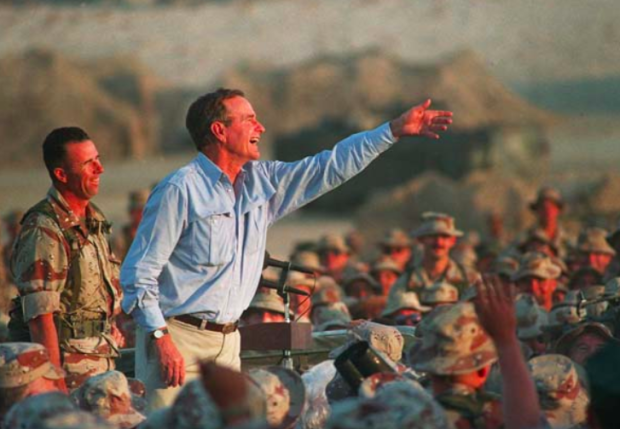George HW Bush and the Middle East: How his legacy lives on

George HW Bush, the 41st President of the United States, has died at the age of 94.
His spokesperson, Jim Mcgrath, confirmed Bush's death via Twitter on Friday but did not say how the former president passed away.
The one time CIA director and decorated World War Two navy pilot served only one term as president, defeated by Bill Clinton when he ran for re-election.
However, during his time in office between 1989 to 1993, Bush presided over immense geopolitical upheaval, following the end of the Cold War and the collapse of the Soviet Union.
The legacy of his decisions can be felt the world over, including in the Middle East.
Below are some of Bush's main actions with regard to the region.
First Gulf War

US troops train for gas attack in a bunker inside Saudi Arabia during Operation Desert Sheild (AFP)
Bush's decision to launch Operation Desert Shield, otherwise known as the First Gulf War, was a crucial moment in the history of the Middle East.
Fearing that Saddam Hussein would go into Saudi Arabia after occupying Kuwait in 1990, Bush launched an international coalition against the Iraqi leader and bided his time by amassing US troops inside Saudi Arabia.
The operation, launched on 24 February 1991, lasted 100 hours and cost the lives of 148 US soldiers and 20,000 Iraqi troops.
When asked why he did not invade Iraq and oust Saddam, Bush said: “To occupy Iraq would shatter our coalition, turning the whole Arab world against us, and make a broken tyrant into a latter-day Arab hero.
“It would have taken us way beyond the imprimatur of international law, … assigning young soldiers to a fruitless hunt for a securely entrenched dictator and condemning them to fight in what would be an unwinnable urban guerrilla war."
Commenting on the conflict on Saturday, the New York Times wrote: "Some critics have said that Mr Hussein would not have been so bold as to invade Kuwait had Washington not shamelessly cultivated him over the years; others faulted Mr Bush for not pushing Mr Hussein all the way back to Baghdad and removing him from power.
"Such a course, Mr Bush said later, would have 'incurred incalculable human and political costs … We would have been forced to occupy Baghdad and, in effect, rule Iraq.'
"Which is exactly what his son, George W Bush, a less cautious man, set out to do 12 years later – with disastrous results."
No-fly zones

Kurdish calls for independence have grown stronger in the last decade (AFP)
In 1992, Bush led the call for a no-fly zone which was introduced in northern Iraq to protect Iraq's Kurdish and Shia populations in the south.
The US, Britain and France used UN Resolution 688 as a pretext to launch the no-fly zones, despite the resolution containing no explicit authorisation.
The no-fly zones allowed for a semi-autonomous region of Kurds to emerge and helped pave the way for continued calls for independence to this day.
US troop presence in Saudi Arabia

George HW Bush spending his thanksgiving with US troops stationed inside Saudi Arabia in 1991 (Reuters)
Bush's decision to send a large contingent of US troops to Saudi Arabia to prepare for Operation Desert Sheild helped sow the seeds for later events that would reshape the region.
The presence of US forces in Saudi Arabia angered many Saudis, including Osama Bin Laden, and was a key reason cited by the protagonists for the September 11, 2001 attacks on the US.
Despite the anger and the end of Operation Desert Shield, the US maintained a troop presence in Saudi Arabia until 2003.
Opposition to Israeli settlements in Gaza and West Bank

Bush opposed to give Israel loans until it agreed to not build settlements in Gaza and West Bank for Russian immigrants (AFP)
Bush continued the official US position of long-standing opposition to Israeli settlement building in the occupied Palestinian territories.
Following the end of the Cold War, Israel sought out loans from the US to build settlements for Jewish refugees coming from the USSR.
In 1991, Bush withheld loan guarantees for settlement building until Israel agreed not to settle new Jewish immigrants in Gaza and the West Bank.
Helping Israel diplomatically

Bush helped revoke a UN resolution equating Zionism to a form of racism and racial discrimination (Reuters)
During his one term as president, Bush successfully lobbied the UN to revoke the 1975 UN resolution which likened Zionism to racism and as a form of racial discrimination.
Bush oversaw the Madrid Conference, which brought together Israel and all of its Arab foes to discuss the Palestinian peace process for the first, and to date only, time.
He also encouraged China and Russia to build ties with Israel and helped pave the way for diplomatic relations to emerge.
[contf]
[contfnew]

middle east eye
[contfnewc]
[contfnewc]




